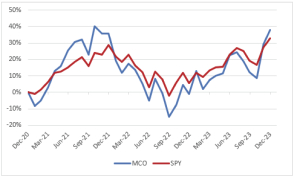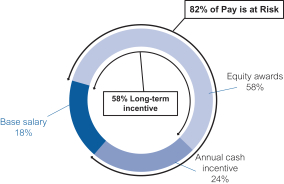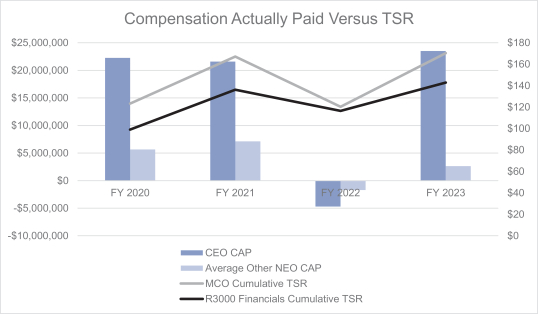PRELIMINARY PROXY STATEMENT—SUBJECT TO COMPLETION

|
March [●], 2024 |
Dear Stockholder:
You are cordially invited to attend the 2024 Annual Meeting of Stockholders of Moody’s Corporation to be held on Tuesday, April 16, 2024, at 9:30 a.m. EDT. Due to the greater access that it provides to our stockholders, the Board of Directors has directed that the 2024 Annual Meeting be held as a “virtual meeting” via the internet. We have designed the format of the Annual Meeting to provide stockholders the same ability to participate that they would have at an in-person meeting.
The Notice of Annual Meeting and Proxy Statement accompanying this letter describe the business to be acted upon at the meeting. The Annual Report for the year ended December 31, 2023 is also enclosed.
On March [●], 2024, we mailed to many of our stockholders a Notice of Internet Availability of Proxy Materials (the “Notice”) containing instructions on how to access our 2024 Proxy Statement and 2023 Annual Report and vote online. The Notice included instructions on how to request a paper or e-mail copy of the proxy materials, including the Notice of Annual Meeting, Proxy Statement, Annual Report, and proxy card or voting instruction card. Stockholders who requested paper copies of the proxy materials or previously elected to receive the proxy materials electronically did not receive a Notice and will receive the proxy materials in the format requested.
Your vote is important. Whether or not you plan to attend the Annual Meeting, we encourage you to review the proxy materials and hope you will vote as soon as possible. You may vote by proxy over the internet or by telephone by using the instructions provided in the Notice. Alternatively, if you requested and received paper copies of the proxy materials by mail, you can also vote by mail by following the instructions on the proxy card or voting instruction card. Voting over the internet, by telephone, or by written proxy or voting instruction card will ensure your representation at the Annual Meeting regardless of whether you attend. Instructions regarding the three methods of voting are contained in the Notice or proxy card or voting instruction card.
| Sincerely, | ||

|

| |
| Vincent A. Forlenza Chairman of the Board |
Robert Fauber President and Chief Executive Officer | |


























